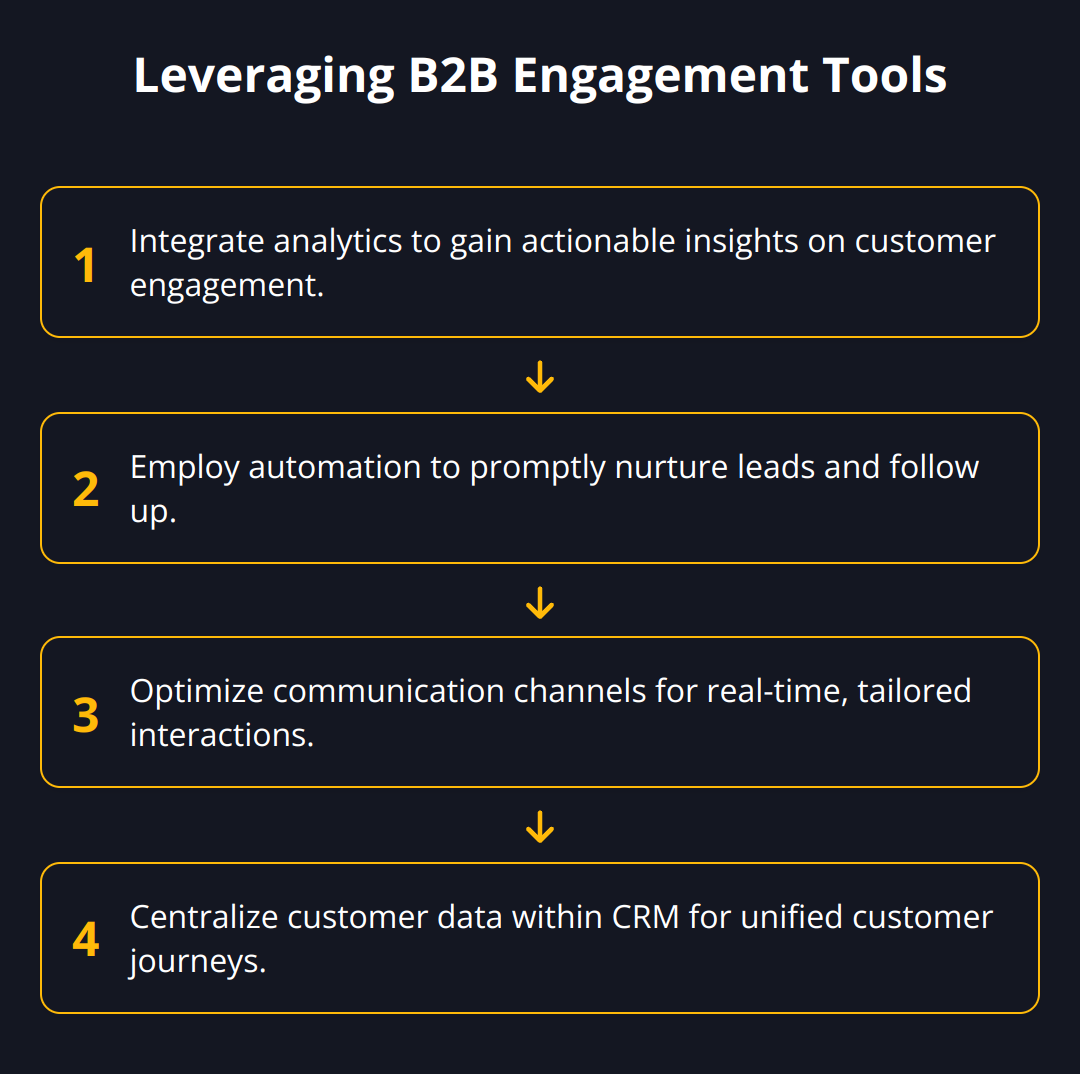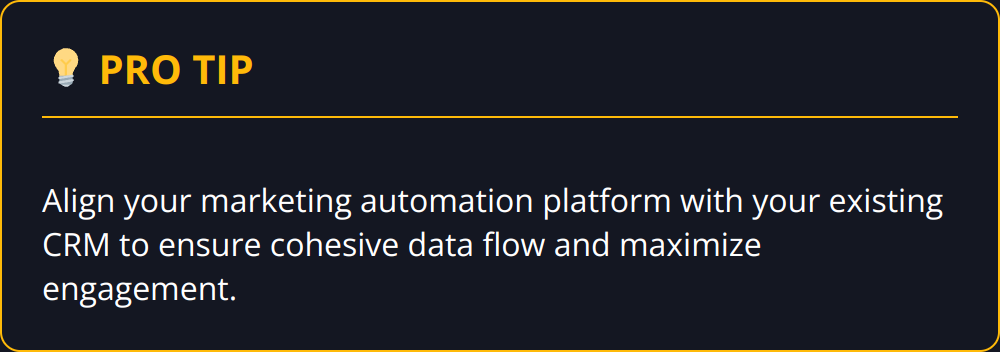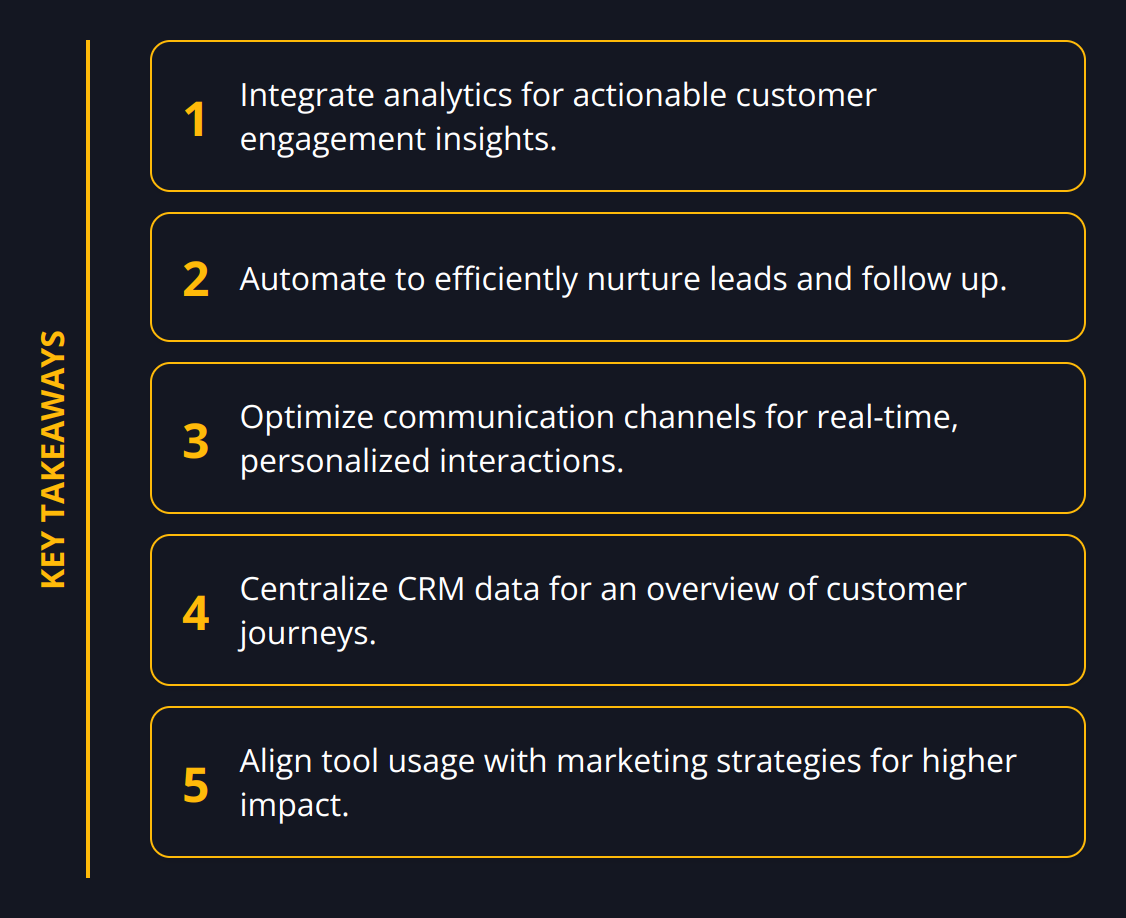In the digital age, engaging effectively with business customers is more about smart strategy than ever before. At newroom connect, we understand the profound impact that B2B digital engagement tools have on fostering robust business relationships and driving growth.
Diving into the distinct components and types of these tools will uncover their essential role in today’s B2B landscape. This blog will offer practical advice on harnessing their power efficiently to amplify your business success.
B2B Engagement Tool Essentials
In today’s competitive business environment, digital engagement tools are indispensable for building and maintaining relationships with other businesses. They enable companies to interact with their customers in a streamlined and scalable manner. Understanding the nuances of B2B engagement tools is fundamental for any company aiming to enhance its digital strategy.
Firstly, it is vital to grasp what exactly B2B digital engagement tools are. These tools are specialized software designed to manage, optimize, and track interactions with current and prospective business clients. The objective is to nurture these relationships throughout the customer journey—from initial contact to post-sale support. Their importance cannot be overstated; they provide the foundation for data-driven insights, personalized communications, and measurable outcomes that are the bread and butter of successful B2B commerce.

Effective B2B engagement tools should include several key components. A good tool will offer analytics functionalities to measure engagement and understand client behavior. It also provides communication platforms such as email marketing and chat services, allowing for real-time, personalized engagement. Automation features also play a significant role, saving time by handling repetitive tasks and nurturing leads effectively. Additionally, CRM integration ensures that all client information is centralized, offering a holistic view of customer interactions.
When comparing B2B to B2C engagement tools, there are notable differences primarily in scale, complexity, and the nature of interactions. B2B tools need to cater to a longer sales cycle, a smaller customer base with higher stakes per transaction, and they must be adept at managing intricate data and multiple stakeholders. In contrast, B2C tools often focus on vast audience outreach and cater to individual consumers, with less emphasis on long-term nurturing.

Practical Steps to Leverage B2B Engagement Tools:
-
Integrate analytics to gain actionable insights on customer engagement.
-
Employ automation features to promptly nurture leads and follow up.
-
Ensure your communication channels are optimized for real-time, tailored interactions.
-
Centralize customer data within your CRM for a unified overview of customer journeys.
-
Recognize and adapt to the specifics of B2B transactions in your engagement strategies.
By understanding and deploying these essential components within your B2B engagement tools, you can enhance not only the effectiveness of your customer relationships but also the efficiency of your operational processes. Interested in bringing your B2B engagement to a higher level of efficiency? Consider exploring the potential of digital experience platforms which can provide a more immersive and interactive way to connect with business clients.
B2B Digital Engagement Tools
Harnessing the right digital engagement tools can be a game changer for B2B companies. Given the long sales cycles and the high-value transactions typical in B2B markets, the strategic application of technology can significantly boost engagement and streamline processes.
Customer Relationship Management systems stand at the core of B2B engagement, providing a centralized database of customer interactions and sales activities that helps companies build stronger, more informed relationships with their clients. A CRM system isn’t just a contact management tool; it’s the heartbeat of your sales strategy, informing every interaction with valuable context and history. Utilizing CRM analytics can pinpoint opportunities for up-selling and cross-selling, helping to anticipate customer needs and preferences.
Marketing automation platforms represent another pillar in the B2B digital toolbox. Automating repetitive tasks such as email campaigns, social posts, or even lead scoring helps to ensure no opportunity is missed. Yet, it’s important to select a platform that aligns with your existing CRM to ensure a cohesive flow of data. A good marketing automation platform can tell you exactly which content resonates with your prospects, advancing them along the sales funnel more effectively.
Social media management tools are essential to maintain visibility and engagement in an era where buyers rely heavily on social proof and peer opinions before committing to a purchase. By managing multiple channels within a single platform, companies can maintain a consistent brand voice and ensure prompt response times, which are often expected by B2B clients.
To effectively employ these tools, consider these practical steps:
-
Regularly update and cleanse your CRM data to ensure accuracy.
-
Craft personalized automations that reflect the buyer’s journey stages.
-
Choose social media tools that offer comprehensive analytics for better decision-making.
-
Train your team on these tools to maximize their potential.
-
Align tool usage with marketing strategies for greater impact.
In connecting with clients, remember that the strength of your engagement largely depends on the relevance of your communications. Advanced CRM systems allow for deep personalization strategies, which, according to recent trends, can lead to a 16% uplift in sales conversions. Moreover, platforms offering AI-driven insights can provide predictive analytics that sharpens the precision of your marketing efforts.

Data is clear on the benefits; companies that leverage CRM and automation effectively see up to a 14.5% increase in sales productivity. As for social media management, with 89% of B2B researchers using the web during the decision-making process, not actively managing these channels is a significant missed opportunity.
Selecting and mastering these tools is not just about following trends. It’s about intentionally crafting a digital environment that leads to meaningful interactions, streamlined operations, and ultimately, sustained business growth. Remember that tools are only as good as the strategy they support, and these digital assets serve to magnify the effectiveness of a well-thought-out engagement plan.

Streamlining B2B Digital Engagement
Effective use of B2B digital engagement tools is not just about the tools themselves—it’s about how these tools align with your business goals and integrate seamlessly into your existing systems to drive growth. Utilizing these tools should be a strategic decision backed by clear objectives and a robust understanding of your customer journey. Here are best practices to leverage these tools for maximum impact.
Match Tools to Business Objectives
It’s imperative that every digital engagement tool you use directly supports your overall business strategy. If your goal is customer acquisition, your tool should have strong lead generation features. If customer retention is the aim, look for tools with advanced analytics to understand and predict customer needs.
-
Implement CRM analytics to keep on top of customer satisfaction and preempt churn.
-
Use data from marketing automation to refine your sales strategies and customer outreach.
-
Employ social media insights to guide content strategy that reflects your brand’s objectives.
Integration for a Streamlined Workflow
Tools must not exist in isolation but should integrate flawlessly with your existing systems, creating a streamlined workflow. Poor integration can lead to data silos and inefficiencies.
-
Choose engagement platforms that offer API connectivity with your current software.
-
For a CRM to function properly, it should sync with your email, calendar, and customer support platforms.
-
Marketing automation should feed seamlessly into your CRM, enriching the customer profiles with behavioral data.
Measure to Improve
Constant performance analysis isn’t just important; it’s mandatory for success. Set clear KPIs for every tool and constantly review performance against these metrics. This data-driven approach will inform adjustments to your strategy and tech stack.
-
Set up specific goals for each digital engagement tool and regularly check progress.
-
Analyze customer feedback to spot areas for improvement in your engagement tactics.
-
Regularly track the ROI of engagement activities to justify the investment in these tools.
By tailoring your tools to your business goals, ensuring smooth integration, and continuously measuring performance against key indicators, you’re not just running with the digital transformation—you’re spearheading it.

And while you’re focusing on engagement, don’t forget the human aspect. The data you gather through these digital tools should inform more personal, meaningful interactions with your clients. Hyper-personalized customer experiences aren’t just preferred; they are expected, with data revealing that personalized strategies can see a 16% increase in customer conversion rates.
In conclusion, aligning your B2B digital engagement tools with strategic goals, ensuring smooth system integration, and relentlessly tracking performance will empower you to not just meet but exceed your business aspirations.
Wrapping Up
Digital engagement tools play an integral part in the advancement of B2B relationships and business success. They speed up and refine how companies communicate with each other, ensuring interactions are insightful, personal, and productive. The use of such tools often leads to enhanced customer understanding and a greater depth of business interactions.

The significance of these tools will only grow in a digital-first world where expectations for efficient, responsive, and personalized engagement continue to rise. With customers searching for more meaningful and user-friendly experiences, businesses must adapt swiftly to stay competitive. The coming years will likely see a further shift towards the integration of advanced analytics, AI-driven personalization, and the simplification of complex B2B processes through digital solutions.
To achieve sustainable success, businesses should encourage the continual adoption and improvement of B2B digital engagement platforms. Regular analysis and progression with these tools are essential for companies that aim to remain at the forefront of their industries. By adopting a dynamic approach to tool evaluation and ensuring a dedication to the latest advancements, businesses can capitalize on the evolving landscape.
As companies expand their digital capabilities, they must also consider how virtual environments can enhance customer engagement. This is where we at newroom connect come into play. By offering a sophisticated platform for creating virtual exhibitions and e-learning experiences, we enable businesses to forge and maintain strong connections with their customers in a dynamic and visually stunning manner. Our software leverages the power of Unreal Engine 5 and Ready Player Me, granting users access to the forefront of virtual realism and personalization.
Discover how you can transform your digital engagement methods through our expert-supported solutions that cater perfectly to a wide array of uses. Visit newroom connect and join the revolution of immersive virtual experiences that promise a compelling shift in how B2B commerce operates.
In a digital-first future, B2B companies are called to not only adopt but master digital engagement tools to succeed. Digital engagement sits at the heart of contemporary B2B strategies, blending technology with the human touch to create customer relationships that stand the test of time. As we continue to move forward, it becomes evident that harnessing the full potential of digital environments will be indispensable in driving the next wave of B2B growth and innovation.


